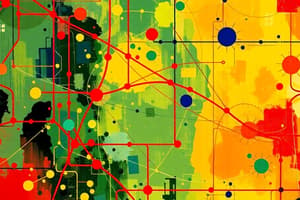Podcast
Questions and Answers
What does the java.io.Reader class primarily do?
What does the java.io.Reader class primarily do?
- Flushes data to the console.
- Writes bytes to an output stream.
- Converts characters to bytes.
- Reads characters from a character stream. (correct)
Which method in the Writer class is used to write a single character?
Which method in the Writer class is used to write a single character?
- writeSignature()
- write(int c) (correct)
- writeChar()
- writeElement()
What is the purpose of the flush() method in the Writer class?
What is the purpose of the flush() method in the Writer class?
- To read data from a character stream.
- To skip characters in the stream.
- To close the stream.
- To ensure all data is written out. (correct)
What advantage does BufferReader provide over simple reading methods?
What advantage does BufferReader provide over simple reading methods?
How does the InputStreamReader handle data?
How does the InputStreamReader handle data?
Which method allows the Reader class to determine if it can read data without blocking?
Which method allows the Reader class to determine if it can read data without blocking?
Which method in the Reader class skips over a specified number of characters?
Which method in the Reader class skips over a specified number of characters?
What type of streams do the FileReader and FileWriter classes work with?
What type of streams do the FileReader and FileWriter classes work with?
What is the primary role of a server in relation to clients?
What is the primary role of a server in relation to clients?
Which method is used to forcibly write any buffered data in an output stream?
Which method is used to forcibly write any buffered data in an output stream?
What happens if a stream is not closed in a long-running program?
What happens if a stream is not closed in a long-running program?
What is indicated by returning -1 from a read() method on an input stream?
What is indicated by returning -1 from a read() method on an input stream?
What is the main advantage of using readers and writers in Java I/O?
What is the main advantage of using readers and writers in Java I/O?
Which method is NOT a key method of the java.io.OutputStream class?
Which method is NOT a key method of the java.io.OutputStream class?
What is the purpose of filter streams in Java I/O?
What is the purpose of filter streams in Java I/O?
What should you do before closing an output stream to avoid data loss?
What should you do before closing an output stream to avoid data loss?
What is the primary function of BufferedOutputStream?
What is the primary function of BufferedOutputStream?
Which of the following methods does an InputStream use?
Which of the following methods does an InputStream use?
Which type of stream is responsible for handling text in formats like UTF-8?
Which type of stream is responsible for handling text in formats like UTF-8?
What happens when you call the read() method of a BufferedInputStream with an empty buffer?
What happens when you call the read() method of a BufferedInputStream with an empty buffer?
Which predefined stream variables are included in the System class?
Which predefined stream variables are included in the System class?
What is the significance of autoFlush in PrintStream?
What is the significance of autoFlush in PrintStream?
Which method is NOT part of OutputStream functionality?
Which method is NOT part of OutputStream functionality?
What is the primary purpose of filter streams?
What is the primary purpose of filter streams?
What does the method isFile() return?
What does the method isFile() return?
What is the function of the length() method?
What is the function of the length() method?
Which interface must a class implement to allow serialization?
Which interface must a class implement to allow serialization?
What is the primary purpose of the ObjectOutputStream class?
What is the primary purpose of the ObjectOutputStream class?
What is the logical connection identified by a number called?
What is the logical connection identified by a number called?
Which range of ports is reserved for 'well-known' services?
Which range of ports is reserved for 'well-known' services?
When a client connects to a server, what does it normally create to establish communication?
When a client connects to a server, what does it normally create to establish communication?
What happens when the server receives a connection request from a client?
What happens when the server receives a connection request from a client?
What should you wrap around a FileReader to improve reading efficiency?
What should you wrap around a FileReader to improve reading efficiency?
Which method is used to read a line from a BufferedReader?
Which method is used to read a line from a BufferedReader?
What type of exception is thrown if a file cannot be found when using FileInputStream?
What type of exception is thrown if a file cannot be found when using FileInputStream?
What will the canWrite() method return if the file is not writable?
What will the canWrite() method return if the file is not writable?
Which statement is true about the File methods?
Which statement is true about the File methods?
What must be done after finishing file operations, such as using FileReader or FileWriter?
What must be done after finishing file operations, such as using FileReader or FileWriter?
Which class handles byte streams for file operations in Java?
Which class handles byte streams for file operations in Java?
What does the isDirectory() method indicate about the file object?
What does the isDirectory() method indicate about the file object?
Flashcards
Client-Server Architecture
Client-Server Architecture
A network model where servers provide services to connected clients.
Server
Server
A computer program or device that manages and provides services to clients.
Client
Client
A computer program or device that requests services from a server.
Java I/O Streams
Java I/O Streams
Signup and view all the flashcards
Input Stream
Input Stream
Signup and view all the flashcards
Output Stream
Output Stream
Signup and view all the flashcards
Filter Stream
Filter Stream
Signup and view all the flashcards
OutputStream.write(byte[] data)
OutputStream.write(byte[] data)
Signup and view all the flashcards
InputStream.read()
InputStream.read()
Signup and view all the flashcards
BufferedOutputStream
BufferedOutputStream
Signup and view all the flashcards
BufferedInputStream
BufferedInputStream
Signup and view all the flashcards
PrintStream
PrintStream
Signup and view all the flashcards
System.out
System.out
Signup and view all the flashcards
System.in
System.in
Signup and view all the flashcards
System.err
System.err
Signup and view all the flashcards
FileReader
FileReader
Signup and view all the flashcards
FileWriter
FileWriter
Signup and view all the flashcards
Closing streams
Closing streams
Signup and view all the flashcards
Flush
Flush
Signup and view all the flashcards
Serialization
Serialization
Signup and view all the flashcards
Deserialization
Deserialization
Signup and view all the flashcards
Ports
Ports
Signup and view all the flashcards
Sockets
Sockets
Signup and view all the flashcards
Study Notes
Client-Server Architecture
- Servers provide services to clients that connect to them.
- A server operates on a hosting machine and responds when a client initiates communication.
- Common server services include web page hosting.
- Web browsers like Firefox and Chrome function as clients accessing web servers.
Java I/O Streams
- Java Input/Output is structured around streams, which are sequences of data.
- Input streams read data, while output streams write data; both types share fundamental read and write methods.
- Filter streams can modify data during the reading or writing process.
- Readers and writers are specialized for text handling, converting it instead of just working with bytes.
Output Streams
- Java's output class is
java.io.OutputStream, which includes key methods:write(int b): Writes a single byte.write(byte[] data): Writes an array of bytes.write(byte[] data, int off, int len): Writes a portion of an array.flush(): Ensures all buffered data is written out.close(): Releases resources associated with the stream.
Importance of Closing Streams
- The
close()method frees resources like file handles and network ports. - Closing the stream ends any associated network connection.
- Attempting to write to a closed stream will throw an
IOException. - Not closing streams in long-running applications can lead to resource leaks.
Flushing Streams
- Flushing a stream before closing prevents data loss.
- It helps mitigate hard-to-diagnose errors that might arise from incomplete data writing.
Input Streams
- The core input class for Java is
java.io.InputStream, with essential methods:int read(): Reads a single byte.int read(byte[] data): Reads bytes into an array.int read(byte[] data, int off, int len): Reads bytes with an offset.long skip(long n): Skips over a defined number of bytes.int available(): Returns the number of bytes that can be read.close(): Closes the stream and frees resources.
- The end of a stream is signaled by returning -1.
Filter Streams
- Filter streams enhance byte streams by converting raw data formats, such as compression.
- Two types of filters exist: filter streams (for bytes) and readers/writers (for text).
- Both filter input and output streams support similar methods as their respective streams.
Buffered Streams
BufferedOutputStreamtemporarily collects data in a buffer until it's full or flushed for efficiency.- Constructors for
BufferedOutputStreaminclude:BufferedOutputStream(OutputStream out)BufferedOutputStream(OutputStream out, int bufferSize)
BufferedInputStreamuses a buffer to read data first and only fetches from the source if needed.
Print Streams
PrintStreamis widely used, withSystem.outbeing a common instance.- Additional constructors for
PrintStreamallow attachment to other output streams, including auto-flushing functionality. - Features
print()andprintln()methods for outputting various data types.
Predefined Streams
- Three predefined stream variables in the
Systemclass:System.out: Standard output to the console.System.in: Standard input from the keyboard.System.err: Outputs error messages to the console.
System.inis anInputStream, whileSystem.outandSystem.errarePrintStreamobjects.
Readers and Writers
java.io.Readerandjava.io.Writerclasses are designed for character read/write operations using Unicode.FileReaderandFileWriterare specific for file reading and writing.- Methods in the
Writerclass support various forms of writing characters and includeflush()andclose().
Input/Output Stream Classes
InputStreamReader: Converts bytes from an input stream to characters using encoding.BufferedReader: Improves reading efficiency by utilizing a buffer.- File creation for reading and writing involves
FileReaderandFileWriter, typically wrapped around buffered or print streams for better performance.
File Handling
- Use
FileInputStreamandFileOutputStreamfor file operations. - Constructors throw
FileNotFoundExceptionif issues arise with file accessibility or existence. Fileclass methods (e.g.,canRead(),delete(),exists(),length()) enable various file-related operations.
Command-Line Parameters
- Java allows passing parameters during execution, accessible in the main method via an array of Strings.
Serialization
- Serialization saves an object's state in a byte stream for persistent storage, retrievable through deserialization.
- Classes implementing the
Serializableinterface can be serialized and deserialized usingObjectOutputStreamandObjectInputStream.
Ports and Sockets
- A port is a numbered connection point for services, ranging from 1 to 65,535, with ports 1-1023 being "well-known" for standard services.
- Sockets facilitate communication between client and server, with each end of the connection represented by a socket.
- Servers generate a dedicated socket for communication after receiving connection requests from clients.
Studying That Suits You
Use AI to generate personalized quizzes and flashcards to suit your learning preferences.




